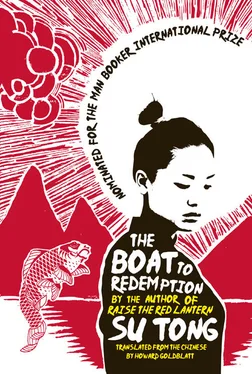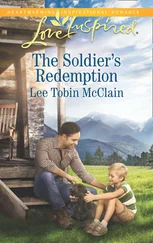Huixian’s anger stunned Old Seven and his friends. They backed off, grinning, and said, ‘What’s got into our Little Tiemei to make her so mad? We’re doing this for you. Once we take care of him, he won’t come around to bother you ever again.’
‘Don’t you try to toss me on to a manure pile. I don’t even know you. If you want to do something for me, then get the hell out of here!’ Then she turned and hit me with her hairdryer. ‘Why are you still lying there, stupid? Nobody on the shore likes you or wants to help you. For that you need the people in the fleet, so get yourself back on your boat.’
I tried to get up, but couldn’t, so she reached down, took my hand and pulled me to my feet. Old Seven came over to stop her. ‘Little Tiemei, you’re a miserable little bitch,’ he cursed. ‘We come to your aid, just so you can help him. He’s not the good little boy you think he is. How’d you like him to rape you?’
Huixian spat in his face, then spun around and said, ‘Old Cui, Little Chen, are you men or aren’t you? How can you stand there watching at a time like this. Get over here and help him. Help me!’
I took advantage of the confusion to run out of the door. Old Seven ran after me and kicked me on the hip. I couldn’t get out of the way fast enough. One of his friends picked up a cut-throat razor and ran outside, then threw it at me; luckily, it whizzed past my ear. By then I was in the middle of the street. The old man and woman from across the street were standing in front of their shop. ‘Three against one, what kind of—’ she swallowed the rest, clearly frightened by the looks of the men. Then I heard the old man trying to get them to stop. ‘Let him go,’ he said. ‘You don’t have to get involved with the likes of him, he’s not right in the head.’
I still hadn’t got over my terrible fright, but there was nothing wrong with my head, which was clear enough to recall the adage that a wise man doesn’t fight against impossible odds. But strange as it may sound, in the midst of the fix I had found myself in, I had suddenly longed to see my mother. I’d be safe if she were here. I ran through the intersection and past the general store, followed by curious stares from everyone who saw me. Some even attempted to stop me. ‘What’s wrong, Ku Dongliang? What are you running from?’ Kongpi . All those voices at once, just a jumble of noise. I turned and saw the propaganda poster on a wall and conjured up the image of another mother, a deeply anxious mother holding a faceless child. As I passed the public toilet on People’s Avenue, I caught a glimpse of my mother, Qiao Limin, standing beneath a parasol tree, which she was hitting with the sole of a plastic sandal. ‘You useless son, you see what’s happened to you? You’re just like your father. Why aren’t you running? Run as fast as you can, and come home!’
I ran down the path behind the steel warehouse and instinctively headed for the piers. And when I looked up again, my mother appeared on the path ahead. She had emerged abruptly from the dark recesses of the warehouse gateway. ‘Where are you going?’ she demanded, shaking her sandal in my face. ‘Don’t go back to the boat, not after disobeying him and causing all that trouble. He’ll kill you if he lays hands on you. Go home instead! Go home!’
I stumbled to a stop, and, strangely, my mother faded away. Go home instead! Go home! I wanted nothing more. But where was home? I had no home on the Milltown shore. After eleven years on the river, no home remained on land. All those familiar streets and houses and gates and windows belonged to other people; they had homes, I didn’t.
This was the first time I was willing to do as Mother wanted. Too bad I couldn’t make sense of what she was saying. With nowhere to go, I loitered in the warehouse area until I heard the sound of a bell off to the northwest, telling me that school had finished, and that sound triggered a memory of my childhood and the path I’d taken home at the end of the school day. With no clear purpose in mind, I headed for the scrap-metal heap beside the warehouse. That had been my shortcut. I walked past stacks of prefabricated concrete slabs and wove my way in and around piles of discarded sheet metal and oil drums, until the path opened up on to a familiar street. There it was, Number 9 Workers and Peasants Avenue, my childhood home.
Twilight accentuated the most peaceful street in the heart of Milltown. Workers and Peasants Avenue was no longer worthy of the name. Ordinary residents had moved away, effectively handing the street over to officials. A Jeep and a Shanghai sedan parked in front of houses were testimony to the neighbourhood’s exclusive nature. The cobblestone road had been paved over, and the tightly shut doors were accentuated by the shade of parasol trees, a sign of the elite families inside. The roof and walls of Number 9, my childhood home, had been refurbished — no more birds’ nests and mossy eaves. The red roof tiles were brand new, the walls had recently been whitewashed and were covered by lush loofah gourd vines. The roses my mother had planted were gone.
My childhood home had changed hands several times. The new occupant, I knew, was Director Ji of the General Affairs Building. He had been transferred from the military, where it was said he’d been a regiment vice-commander. He was the head of a large, prosperous and flourishing family. There was a small plaque nailed to the green gate: ‘Five Good Family’, it read, referring to the family virtues of respect for the old and concern for the young, gender equality, marital harmony, household economy and neighbourly solidarity. Was Director Ji’s family really that wonderful? I couldn’t say if the plaque gave me a warm feeling or made me feel hostile. The date tree still standing in the yard dropped a leaf on my head, and when I shook it off, it landed on my shoulder. The leaf alone knew who I was and was welcoming me back. I hadn’t set foot on the street in years. I felt like a stray dog lingering in the ruins of a former dog house.
A youngster rolling an iron hoop came walking by. ‘Did you bring a gift for Director Ji?’ he asked me. ‘There’s no one at home, they’re all at work.’
‘No, I didn’t bring a gift,’ I said. ‘I’m from the Housing Office. Just looking the place over.’
After eleven years on the river, my childhood home was just a reminder of the past. I walked alongside the wall and I spotted the rabbit warren I’d built back then. The Ji family was using it as a rubbish dump. I went up to the window on the eastern wall. It was protected by an iron grille. A curtain on the other side kept out all the light; I couldn’t see inside, but that had been my room. My metal-framed cot had been placed right under the window. I’d like to have seen if it was still there, but I could only pace back and forth outside. I did notice a paper-cut window decoration, a pair of butterflies, so maybe that was now the bedroom of Director Ji’s daughter. I purposefully turned and walked off.
A tall parasol tree stood on the other side of the street, and as I gazed at the shade it provided, I had an idea: that would be an ideal hiding place, a safe spot for me to keep an eye on my childhood home. I started climbing, and the view opened up in front of me. The date tree was still growing; the shade from its canopy covered half the yard. Drying racks had been set up all over the other half, and I was shocked to see all the duck and chicken and fish and meat drying in the sun, more than most families could ever consume. Preserved chicken and duck, pigs’ heads and fish, all in separate groups in the sunlight. I remembered the flowerbed beneath the date tree, where Mother had tended her Chinese rose bushes for years. But unlike other people’s gardens, her roses hadn’t bloomed until the spring we moved away; several flowers, scrawny pink buds, appeared that year for the first time. I’d got up in the middle of the night to relieve myself and had seen her sitting by the flowerbed in the moonlight, reflecting upon her life. ‘This is my fate,’ she’d said. ‘The sins of your father. The roses are about to bloom, just when I’m leaving. I won’t be around to see them.’
Читать дальше












